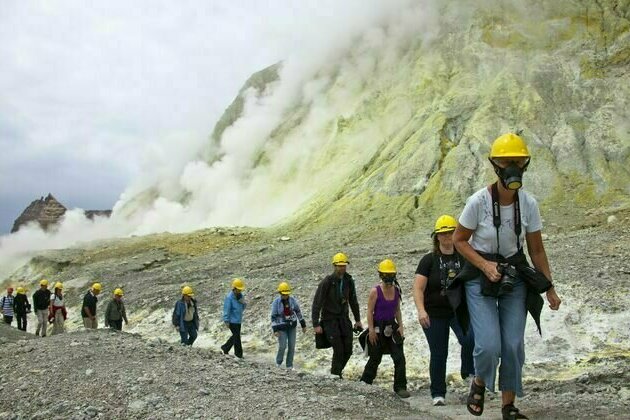Owners are officially no longer responsible for tourism accidents on their land - but they never really were
The Conversation
14 Apr 2025, 19:48 GMT+10

Newly announced reforms to the Health and Safety at Work Act mean landowners will no longer be responsible for tourism-related injuries on their properties. But it's not clear this has ever really been a problem.
Workplace Safety Minister Brooke van Velden says there was an "inadvertent climate of fear" affecting councils, farmers and landowners who allowed access to their land for hunting, fishing, mountain biking and horse trekking. The fear was that they would be held responsible if someone was hurt or killed on their land.
The reforms targeting landowners are part of wider changes to the Health and Safety at Work Act, which was passed in 2015. Under section 37 of the act, a person who controls a workplace is responsible for ensuring that
the workplace, the means of entering and exiting the workplace, and anything arising from the workplace are without risks to the health and safety of any person.
But we found just one instance of landowners being taken to court for adventure activities going wrong on their properties. This was the case against Whakaari Management Ltd, the owners of Whakaari/White Island after the 2019 eruption that claimed 22 lives and injured 25 others.
In 2024, Whakaari Management was found guilty of failing to protect visitors to the island, but that decision was overturned in February this year.
Under the current rules, responsibility for something going wrong rests with the "person conducting a business or undertaking".
A farmer, for example, is conducting business because they own or have control of their land. This does not apply if they are renting out the land but not involved in the activity's management or control.
In the Whakaari Management Ltd appeal the judge wrote:
To be caught by [section] 37, a [a person conducting a business or undertaking] must in fact be exercising active control or management of the workplace in a practical sense. Owning it is not enough. Making money from it is not enough. Merely being able to manage or control a workplace, but not doing so, is not enough.
Active control might include an agreement between the landowner and the activity operator to monitor conditions.
While the Whakaari case is the only one we found where a landowner has been prosecuted under the current rules, there have been a number of court cases involving adventure activity companies.
The key difference between successful and unsuccessful cases seems to be whether the business owners had the ability to influence or change what went wrong.
For example, in cases where customers of diving businesses drowned, the courts have decided the businesses did not have control of the workplace, including the sea, a lake or river.
In one case the judge wrote the business
does not and cannot control flow or conditions nor can it control who uses or goes through the rapid [...] It cannot give directions in relation to it, nor exercise any authority over it.
A business owner operating a kayaking business did have control of the operational conditions and should have had a safe system of work, including checking the weather forecast.
Similar failings were found after a school trip resulted in drownings and after the poor condition of tour buses and uncontrolled driving during a sand-surfing trip resulted in deaths.
Even under the Adventure Activities Regulations - industry specific rule passed in 2010 and updated since - the responsibility for safety in the tourism industry fell on tourism operators, not landowners.
And, from a safety perspective, the rules have been relatively successful. In the past 35 years, there have been about 52 deaths in adventure activities due to natural hazards (including the Whakaari/White Island tragedy). During the same period more than 30,000 workers died at or because of work.
But this relative safety in adventure activities has come at a cost for small businesses. Under the 2010 regulations, the average cost of mandatory audits has been around NZ$5,000 - a cost borne by the small adventure activity businesses.
If the government wants to further improve the safety of the outdoor tourism industry, then it needs to focus on making it easier and cheaper for businesses to comply with the regulations, rather than focusing on protecting landowners from a risk they never really faced.
 Share
Share
 Tweet
Tweet
 Share
Share
 Flip
Flip
 Email
Email
Watch latest videos
Subscribe and Follow
Get a daily dose of International Travel News news through our daily email, its complimentary and keeps you fully up to date with world and business news as well.
News RELEASES
Publish news of your business, community or sports group, personnel appointments, major event and more by submitting a news release to International Travel News.
More InformationBusiness
SectionIndia seeks to fast-track US trade deal after tariff pause
NEW DELHI, India: India is pushing to fast-track a trade agreement with the United States following a temporary pause on new tariffs,...
Vietnam to crack down on rerouted Chinese goods to avoid US tariffs
HANOI, Vietnam: Vietnam is preparing a series of trade enforcement measures as it scrambles to shield itself from sweeping U.S. tariffs,...
AI boom drives TSMC revenue to record highs
TAIPEI, TAIWAN: A strong push from artificial intelligence demand lifted TSMC's quarterly revenue to new highs, with the chipmaker...
Aurora's driverless trucks to tackle tough weather post Texas launch
PITTSBURGH, Pennsylvania: Aurora Innovation says its driverless trucks will eventually be equipped to handle tough weather conditions,...
US Treasury to ease regulatory burden on small banks
WASHINGTON, D.C.: The U.S. Treasury will step more firmly into bank regulation to ensure better balance and less burdensome oversight,...
White House Plans New Push to Boost US coal amid AI energy surge
WASHINGTON, D.C.: The White House is preparing a new directive aimed at reviving domestic coal production as energy demands surge from...
Travel and Tourism
SectionUniversal plans major theme park north of London
LONDON, UK: Universal is setting its sights on Britain as the next destination for its global theme park expansion, marking a major...
"Vision of Dr BR Ambedkar shaped Constitution of India that reflects the soul of India": Sarbananda Sonowal
New Delhi [India], April 14 (ANI): Union Minister Sarbananda Sonowal on Monday called upon the youth to do further research and study...
China's booming, transforming pet industry sees diverse growth
A boy interacts with a cat at Wei Meiling's homestay in Langshuyuan Village, Changzhi City of north China's Shanxi Province, July 25,...
"Parking lot will be constructed near market in Karnaprayag": Uttarakhand CM Dhami
Dehradun (Uttarakhand) [India], April 14 (ANI): Uttarakhand Chief Minister Pushkar Singh Dhami announced on Monday that flood protective...
Owners are officially no longer responsible for tourism accidents on their land - but they never really were
Newly announced reforms to the Health and Safety at Work Act mean landowners will no longer be responsible for tourism-related injuries...
Local guides hold the untranslatable edge in China's tourism boom
Tourists pose for photos at the Yuyuan Garden area in east China's Shanghai, Feb. 1, 2025. (Photo by Chen Haoming/Xinhua) BEIJING,...












